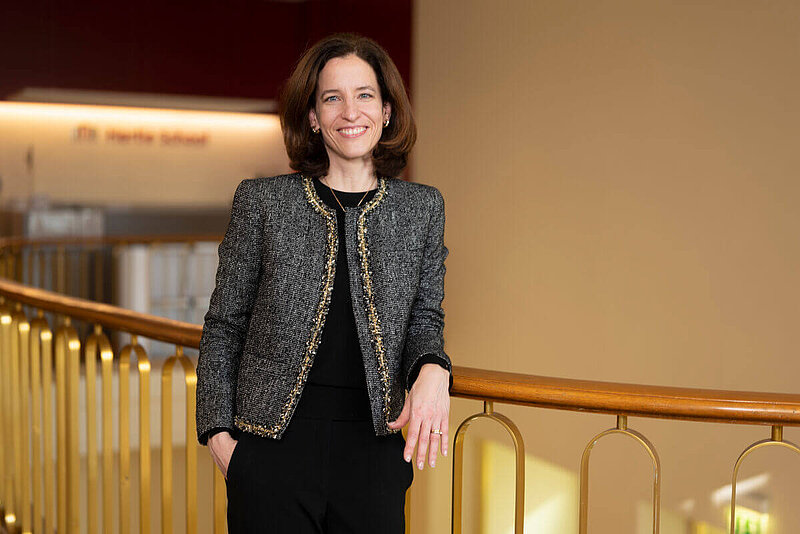
The Professor of International Political Economy shares her views on where Franco-German cooperation stands.
This year marks the 60th anniversary of the signing of the Élysée Treaty. After centuries of rivalry and war, the, agreement between France and Germany that French president Charles de Gaulle and German chancellor Konrad Adenauer signed rang in a new era of friendship and solidarity. Given the current challenges facing the two countries and Europe, where does Franco-German friendship stand? Hertie School President Cornelia Woll gives her take on the current state of Franco-German cooperation.
The Élysée Treaty laid the groundwork for close coordination between France and Germany. Looking at the last year, there were many instances where both countries acted unilaterally, e.g. Germany’s significant financial relief package for its consumers and the recent French initiative to send tanks to Ukraine. Is the Élysée Treaty an irrelevant relict from the past?
The partnership created with the Élysée Treaty in 1963 and renewed by the Aix-La-Chappelle Treaty in 2019 is still highly relevant today. The Élysée Treaty was fundamental in reconciling two former enemies and it brought about institutional innovations such as the Franco-German Ministerial Council, Franco-German Youth Office, Franco-German schools, and the twinning of numerous French and German towns.
It is important to remember that all the key moments of cooperation between the two countries have taken place against a backdrop of tensions and intensive debates, including the original Élysée Treaty. In France, anti-German sentiment was still vivid in 1963, and in Germany Atlanticists criticised the inward-looking strategy of President de Gaulle and Chancellor Adenauer. Later, President François Mitterrand and Chancellor Helmut Kohl worked through their political differences to achieve German reunification and the future of economic and monetary integration in the European Economic Community. The response to the financial crisis in 2008, the ensuing eurozone crisis and the COVID-19 pandemic crucially relied on Franco-German cooperation, and each came with their fair share of tensions. The 60th anniversary is a reminder that frictions are part of any working relationship, and that they can be overcome with political will and a solid foundation for cooperation.
Especially after Brexit, Germany and France are the two economic heavyweights in the EU. Is this a risk or an opportunity for the EU?
Franco-German cooperation is necessary but not sufficient for European projects. With Eastern enlargement, it is clear that the EU has to move beyond Western European concerns and pay attention to Central and Eastern European countries. The Russian invasion of Ukraine has brought this into sharp focus. In security and defence, energy, and economic development, tackling the most challenging issues requires listening to a broader group of voices. Leadership on such topics could still come from a smaller group of countries but should include important member states such as Poland. In recent debates, we see increasing calls for the Weimar Triangle – a format bringing together France, Germany and Poland. Seen from Berlin, such triangular discussion certainly looks both promising and necessary.
Both Olaf Scholz and Emmanuel Macron are constantly under pressure on domestic affairs. How will this influence the Franco-German relationship in the future?
International negotiations always take place against the backdrop of domestic political struggles – the shadow of internal concerns over bilateral relations is nothing new. The nature of opposition in France might be different from the constant coalition bargains in Berlin or the intricacies of German federalism, but both countries need external pressure to bring them closer together and realise their shared interests. Franco-German cooperation is alive and well, and will likely intensify in this challenging geopolitical context. The war in Ukraine, the importance of China for global markets, and the recent move by the United States to subsidise green industries at the expense of European competitors all provide incentives for Europe to defend common objectives. If the European Union wants to remain relevant and tackle the most pressing global stakes, it must take on a leadership role. This can only happen if Germany and France agree on the overall direction and find a way to convince their European partners to join them.
Cornelia Woll joined the Hertie School in 2022 from Sciences Po in Paris. The Franco-German Professor of International Political Economy researches the international political economy, in particular economic policy in Europe and the United States. Her work has examined business-government relations, the recent financial crisis, industrial policies and European integration.
More on our expert
-
Cornelia Woll, President and Professor of International Political Economy
